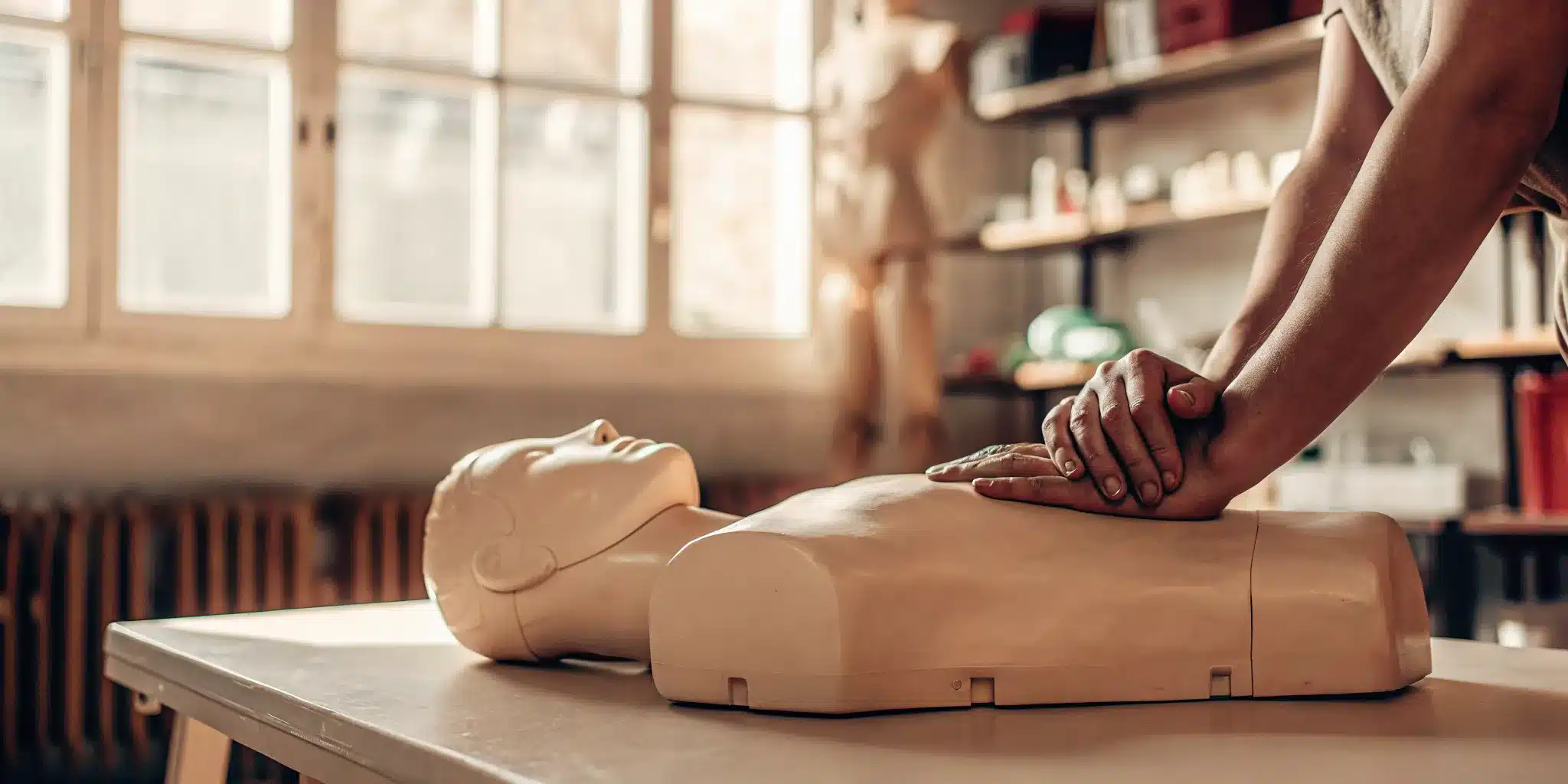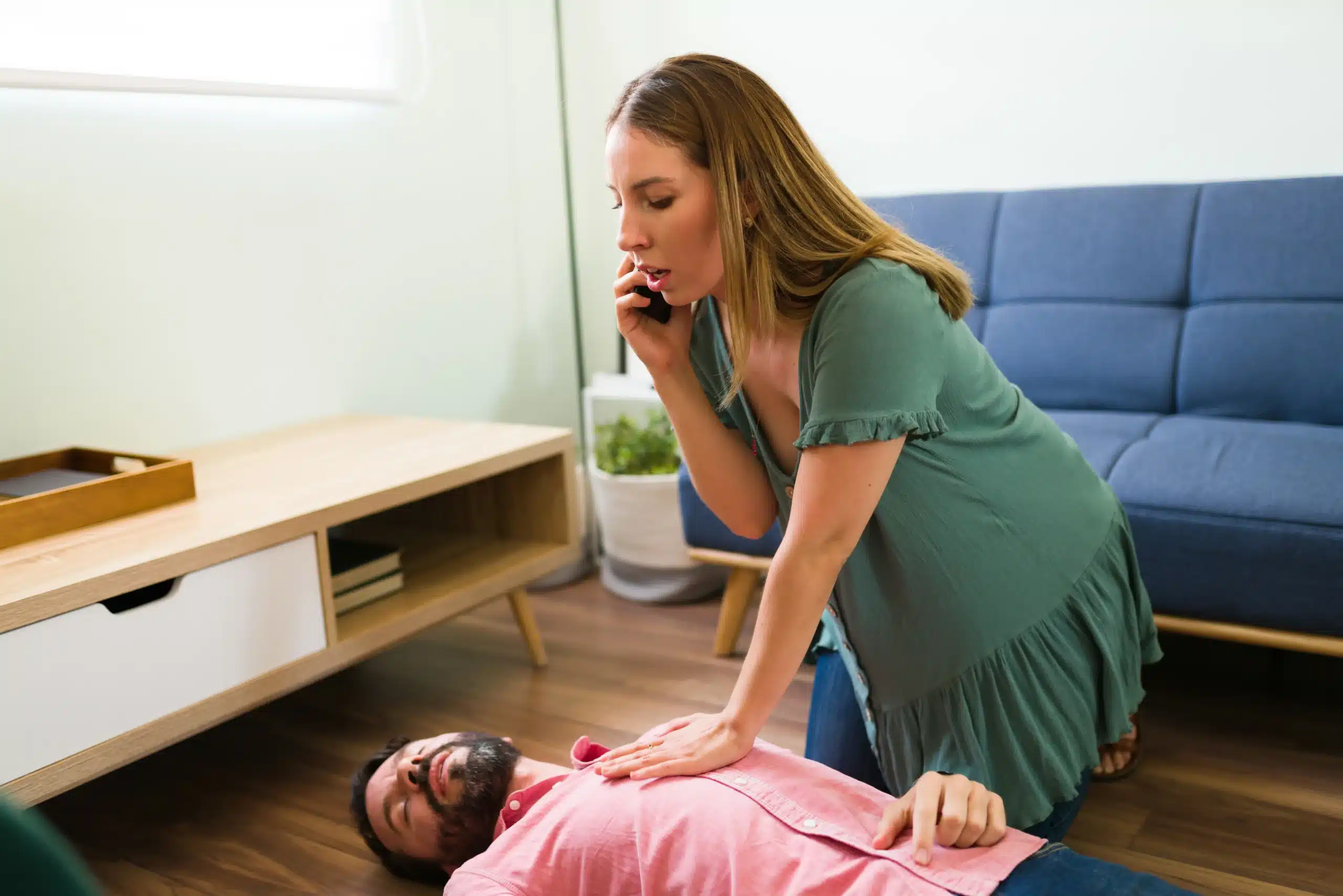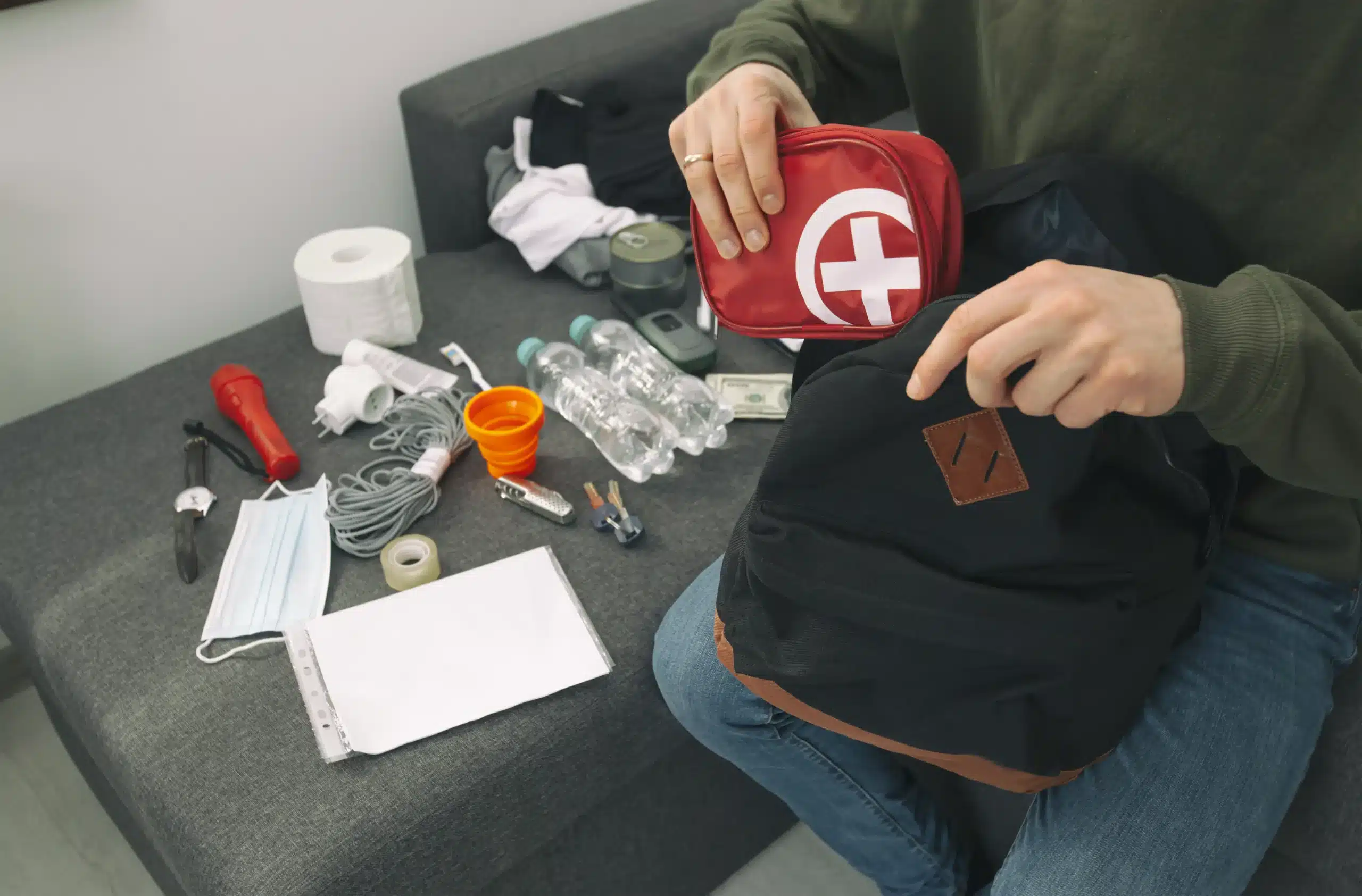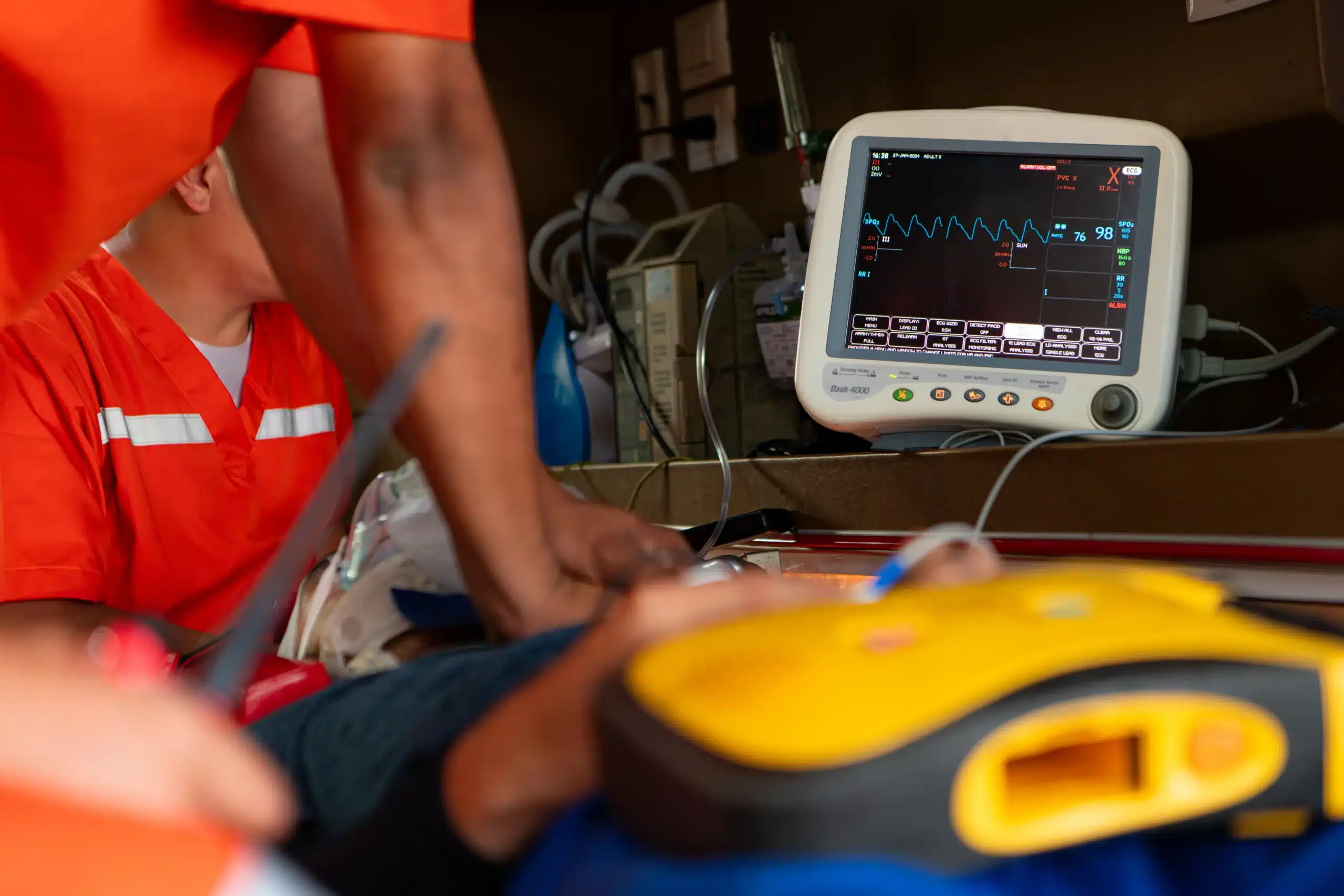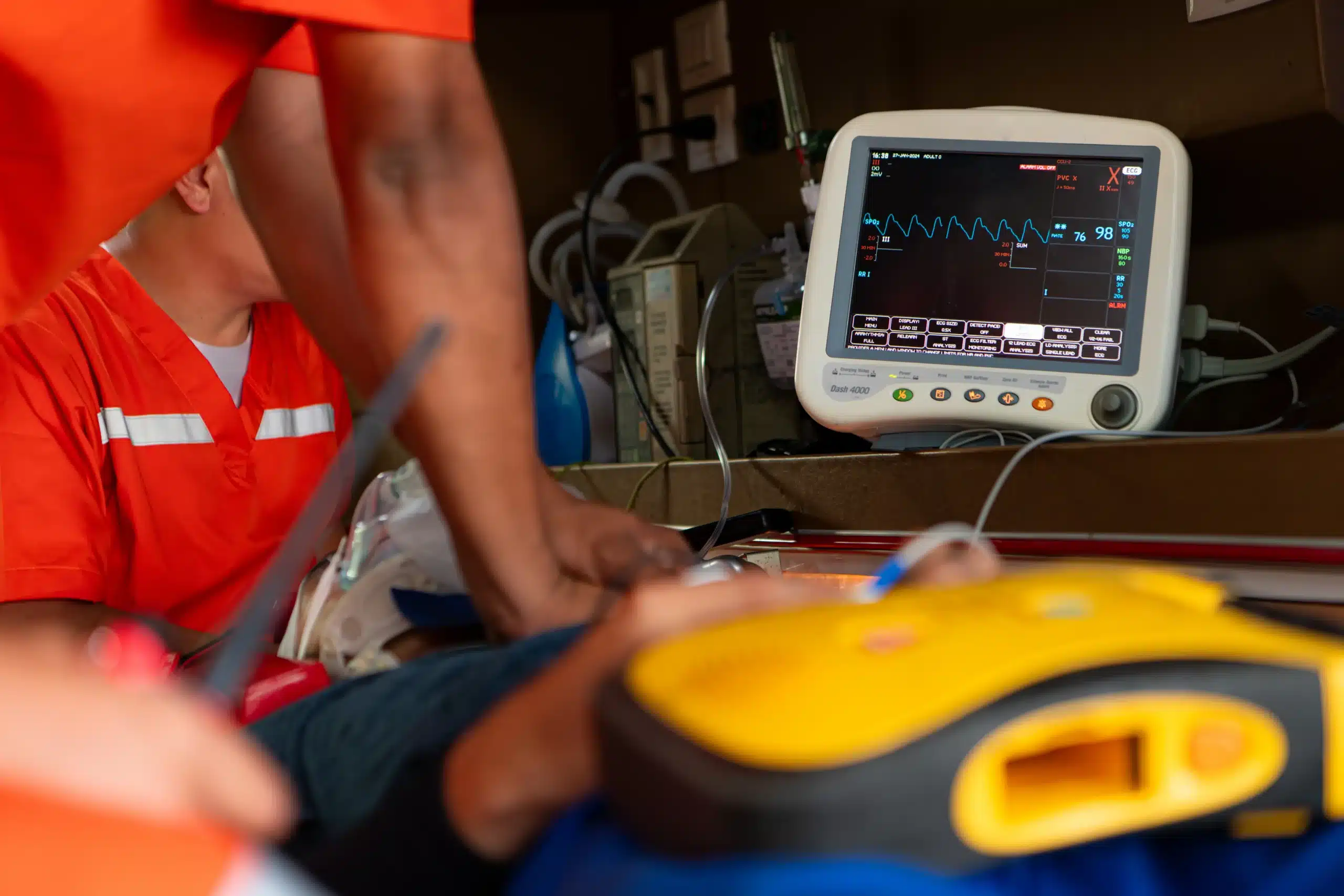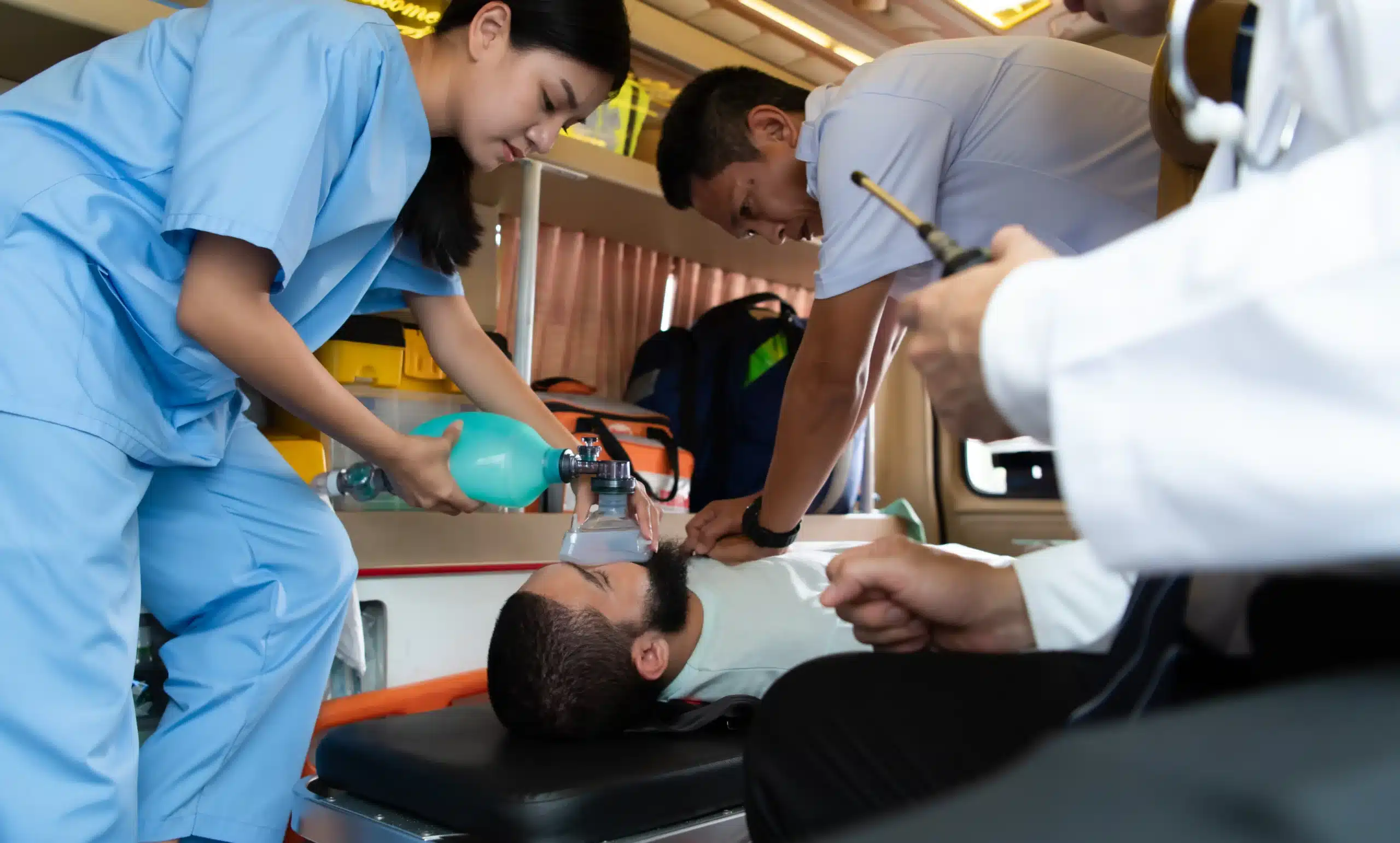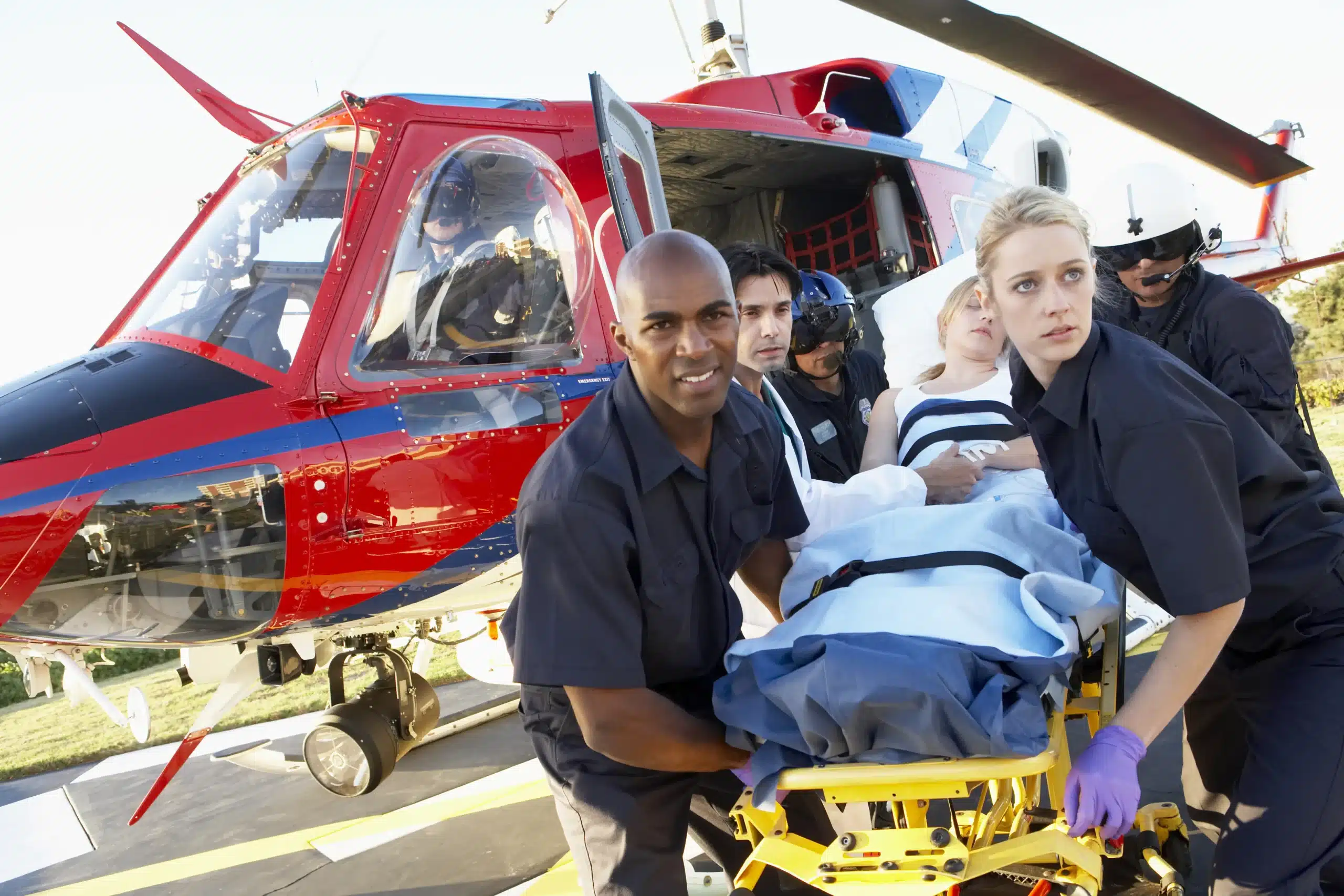Empower yourself with the knowledge and skills to save a life. CPR is a vital skill that everyone should consider learning. This guide breaks down the essentials of CPR, including the different types of CPR classes Rocklin CA offers, the certification process, and how to find the right training program for your needs. We’ll explore the various CPR certifications available, discuss the costs and schedules of classes in Rocklin, Roseville, and Sacramento, and delve into the psychological aspects of performing CPR. Let’s get started and equip you with the confidence to act in emergencies.
Key Takeaways
- CPR skills empower everyone: Find a course—from basic CPR to advanced certifications—that fits your needs and learn how to respond effectively in emergencies.
- Rocklin offers flexible CPR training: Explore local providers, compare costs and schedules, and discover convenient options like group discounts and blended learning.
- CPR training creates a safer Rocklin: Become a vital community member by learning CPR and contributing to a more prepared and resilient city.
What is CPR and Why is it Important?
CPR (Cardiopulmonary Resuscitation) is a lifesaving technique used in emergencies when someone’s heartbeat or breathing has stopped. It involves chest compressions and rescue breaths to maintain blood flow to the brain and other vital organs until professional medical help arrives. Learning CPR empowers you to respond effectively during critical moments and potentially save a life. CPR can bridge the gap while waiting for paramedics or other trained professionals. For a deeper understanding of CPR, take a look at this article about CPR classes.
Debunking Common CPR Misconceptions
One common misconception is that CPR is solely for healthcare professionals. This isn’t true. Anyone can and should learn CPR. Many professions, such as teachers, lifeguards, and childcare providers, often require CPR certification. Another myth is that CPR must be performed perfectly to be effective. While proper technique is essential, any attempt at CPR is better than no action during a cardiac arrest. Even if your certification has lapsed, remember the basics and don’t hesitate to help.
Why CPR Matters in Rocklin
Rocklin, like any community, benefits from residents trained in CPR. These skills are invaluable because cardiac arrests can happen anywhere, at any time. CPR training provides individuals with the knowledge and confidence to respond effectively in such emergencies. Hundreds of thousands of cardiac arrests occur annually in the US, so knowing CPR can significantly impact survival rates. By learning CPR, you contribute to a safer environment for everyone in Rocklin, Roseville, and Sacramento. You become a vital link in the chain of survival, offering immediate support until professional responders arrive. Find a local CPR class and become a lifesaver in Rocklin.
CPR Classes in Rocklin, CA: What are Your Options?
Choosing the right CPR class can feel overwhelming with so many options available. This section breaks down the different types of CPR certification courses offered in Rocklin, helping you find the perfect fit.
Basic Life Support (BLS)
The BLS certification course covers the fundamentals of CPR for adults, children, and infants. You’ll learn how to recognize cardiac arrest, perform chest compressions and rescue breaths, and use an AED. This course is ideal for healthcare providers, first responders, and anyone who wants to be prepared for a cardiac emergency. Safety Training Seminars offers this AHA-certified course along with other life-saving programs.
Advanced Cardiovascular Life Support (ACLS)
The ACLS course is designed for healthcare professionals who manage cardiopulmonary arrest and other cardiovascular emergencies. Building upon the skills learned in BLS, ACLS covers advanced airway management, pharmacology, and team dynamics during resuscitation. Bay Area CPR highlights the importance of this training for professionals in Rocklin.
Pediatric Advanced Life Support (PALS)
Designed for healthcare providers working with infants and children, the PALS course focuses on the specialized skills needed to respond to pediatric emergencies. This training covers everything from respiratory distress and shock to cardiac arrest in young patients. You can find more information on PALS training in Rocklin from resources like Bay Area CPR.
First Aid and CPR
Combining essential first aid knowledge with CPR training, these comprehensive courses equip you to handle various medical emergencies. You’ll learn to treat injuries like burns, cuts, and fractures, and respond to sudden illnesses and allergic reactions. Flexible scheduling options, including online components and in-person skills testing, make these courses accessible.
Top CPR Class Providers in Rocklin
Finding the right CPR class can feel overwhelming, but several excellent providers serve the Rocklin area. Here are a few options to consider:
Rocklin CPR Classes
Rocklin CPR Classes offers a comprehensive range of American Heart Association (AHA) certified courses, including BLS, ACLS, PALS, and First Aid. They also provide EMSA Child Care Health & Safety training. With a convenient location and extensive schedule, they offer classes daily from 8 am to 10 pm, accommodating various schedules. For those looking to train a group, they also offer attractive discounts. Contact them to learn more.
Safety Training Seminars
Known for their competitive pricing and low-price guarantee in Sacramento County, Safety Training Seminars provides a blended learning approach. This combines online learning with in-person skills sessions, offering flexibility and comprehensive instruction. Their certification cards are valid for two years.
Professional CPR
Professional CPR offers various CPR, BLS, AED, and First Aid classes. While their primary location is in Sacramento, they do serve Rocklin and surrounding areas. They also have locations in Modesto, Stockton, and Dallas.
American Red Cross
While based in nearby Roseville, the American Red Cross is another option for those seeking CPR and AED training. They offer a variety of learning formats, including in-person, online, and blended learning, allowing you to choose the style that best suits your needs.
Costs, Schedules, and Discounts for CPR Classes
Finding the right CPR class often involves balancing quality training with affordability and convenience. Let’s break down the typical costs associated with CPR certification, explore available discounts, and discuss the various class schedules and learning formats you can find in Rocklin, CA.
Average Prices
CPR class prices in Rocklin are competitive, and you can find options to fit most budgets. Generally, the cost depends on the type of certification you need. Basic CPR and First Aid classes tend to be more affordable than advanced certifications like ACLS or PALS. Safety Training Seminars offers a range of AHA-certified courses and maintains a low-price guarantee for the Sacramento area, helping ensure accessible training. For the most accurate pricing on CPR classes, it’s always best to check directly with the training provider.
Group Discounts and Promotions
If you’re coordinating CPR training for a group, such as a workplace or community organization, look for group discounts. Many providers offer reduced rates for multiple participants, making it more cost-effective to train your entire team. Organizations like the Red Cross often run promotions and offer discounts, so checking their website for current deals is a smart move. Bundling CPR training with First Aid or other safety courses can also sometimes unlock additional savings. Contact us to learn more about group discounts for your team.
Flexible Class Schedules
Busy schedules shouldn’t be a barrier to learning CPR. Many CPR training centers in Rocklin understand this and offer flexible class times. Rocklin CPR Classes provides courses throughout the week with various start times, making it easier to fit training into your life. Whether you prefer a weekday evening class or a weekend session, you can likely find a schedule that works for you.
Online and Blended Learning
Online and blended learning options have become increasingly popular for CPR certification. These formats offer a convenient way to complete the cognitive portion of the training at your own pace. Blended learning combines online coursework with in-person skills sessions, ensuring you still get the hands-on practice necessary for effective CPR. The Red Cross offers blended learning courses that meet workplace safety standards and provide a flexible path to earning your certification.
What Happens in a CPR Class?
CPR classes are designed to equip you with the life-saving skills needed to respond effectively during emergencies. Whether you’re a healthcare professional or someone wanting to learn essential life skills, understanding the class structure can help you feel prepared.
Hands-on Practice and Equipment
CPR classes aren’t just lectures. They heavily emphasize hands-on learning, providing ample opportunity to practice the techniques you learn. You’ll work with training manikins, which realistically simulate a human body, allowing you to develop the muscle memory and coordination needed for effective chest compressions and rescue breaths. Many courses also incorporate training AEDs (Automated External Defibrillators), familiarizing you with this critical piece of equipment used to restore a normal heart rhythm. This practical training builds confidence and ensures you’re ready to act in a real emergency. For more information on BLS courses including AED training, visit our BLS page.
Key Skills You’ll Learn
In a CPR class, you’ll learn the core principles of CPR, including how to recognize the signs of cardiac arrest and when to initiate CPR. You’ll master chest compressions and rescue breaths, the foundational techniques of Basic Life Support (BLS). Many classes also cover basic first aid skills, equipping you to handle common injuries like cuts, burns, and sprains. Some courses also include AED training, teaching you how to safely and effectively use this device. These combined skills provide a comprehensive approach to emergency response. Check out our BLS course for more details on what you’ll learn.
Assessment and Certification
Most CPR classes include an assessment component to ensure you’ve grasped the material and can perform the techniques correctly. This typically involves a skills test where you demonstrate your CPR technique on a manikin. Upon successful completion, you’ll receive a certification valid for two years, demonstrating your proficiency in CPR and meeting workplace safety standards (OSHA). This certification provides credibility and peace of mind, knowing you’re prepared to handle emergencies effectively. For details on certification, you can explore CPR classes and certification options.
CPR Certification: What You Need to Know
American Heart Association Certification
The American Heart Association (AHA) offers a variety of CPR courses to equip people with lifesaving skills. These courses range from Basic Life Support (BLS) for healthcare providers and other professionals to Advanced Cardiovascular Life Support (ACLS) for advanced medical personnel. The AHA also offers Pediatric Advanced Life Support (PALS), designed for those who work with infants and children. These certifications are widely recognized, ensuring you receive high-quality training. For group discounts, explore Rocklin CPR Classes’ group rates.
Renewing Your Certification
CPR guidelines and best practices are regularly updated. Your CPR certification card is typically valid for two years. Renewing your CPR certification keeps your skills and knowledge current. Staying certified means you’re always prepared to act in a crisis. For questions about renewing your certification or finding the right course, contact Rocklin CPR Classes.
Digital Certification Cards
Many organizations now offer digital CPR certification cards. These electronic versions are convenient and easily accessible. It’s crucial to ensure any online CPR certification you pursue comes from a reputable organization accredited by the AHA. Verifying the issuer’s legitimacy ensures your certification is valid and recognized. If you’re unsure about a program’s validity, check with the AHA or a trusted provider like Rocklin CPR Classes.
Find the Right CPR Class
Finding the right CPR class can feel overwhelming with so many options available. This guide simplifies the process, whether you’re a healthcare professional, member of the general public, or require specialized training. We’ll help you find the perfect fit for your needs in Rocklin, Roseville, and Sacramento.
For Healthcare Professionals
Healthcare providers, such as doctors, nurses, and EMTs, have specific requirements for CPR certification. You’ll need a course aligned with the latest American Heart Association (AHA) guidelines for healthcare professionals. Rocklin CPR Classes offers BLS, ACLS, and PALS certification courses designed for healthcare providers, covering everything from basic life support to advanced cardiac and pediatric life support. These courses emphasize high-quality CPR techniques and often include AED training. Ensure the course you choose aligns with your specific professional requirements. The American Red Cross also offers BLS classes for healthcare providers in nearby Roseville.
For the General Public
If you’re not a healthcare professional but want to learn CPR, many excellent options exist in Rocklin. Rocklin CPR Classes provides a range of AHA-certified courses, including CPR, First Aid, and BLS. These classes equip people with the skills to respond effectively in emergencies. They offer various learning formats, including in-person, online, and blended learning, to suit your schedule and learning style. Check their website for group discounts if you’re learning with others.
Specialized Industry Training
Certain professions, like childcare providers and lifeguards, require specialized CPR training. For those working with children, a Pediatric CPR and First Aid course is essential. Rocklin CPR Classes offers courses tailored to various industries, ensuring you receive relevant, industry-standard training. If you’re unsure which training you need, contact Rocklin CPR Classes for guidance on the appropriate certification.
The Psychological Side of CPR Training
CPR training isn’t just about learning the physical steps; it’s also about preparing yourself mentally and emotionally. Knowing how to react in a high-pressure situation can dramatically affect the outcome.
Managing Anxiety in Emergencies
It’s completely normal to feel anxious when faced with a medical emergency. Your heart races, your breathing gets faster, and you might feel overwhelmed. Understanding that these are typical stress responses is the first step. Regularly practicing CPR techniques can help reduce anxiety and build your confidence, allowing you to react more effectively when every second counts. Thinking through potential scenarios beforehand can also help you manage stress in the moment. For additional tips on managing anxiety in these situations, check out this helpful article on managing CPR anxiety.
Emotional Support and Coping
Providing CPR can be emotionally challenging, even if the outcome is positive. It’s important to acknowledge these feelings and have support systems in place. Many CPR training programs incorporate discussions about emotional coping strategies and resources for post-event support. Talking to colleagues, friends, or family, or seeking professional guidance can help process the experience and prevent long-term emotional distress. This article on the psychology of emergency response offers further insights.
Build Confidence Through Practice
Confidence is a crucial component of effective CPR. The more you practice, the more comfortable you’ll become with the techniques. Regular refresher courses reinforce your skills and help you maintain a sense of preparedness. This ongoing practice builds muscle memory and reduces hesitation, allowing you to act swiftly and decisively in an emergency. Knowing you’re well-prepared can significantly reduce anxiety and empower you to provide assistance when needed. Learn more about the benefits of ongoing training in this guide to coping with CPR-related stress.
CPR Training’s Impact on Rocklin
CPR training has a ripple effect, impacting not only individuals but the entire community. In Rocklin, the commitment to CPR education strengthens the local area in several key ways.
Improve Local Emergency Preparedness
When more people in Rocklin know CPR, the community is better equipped to handle emergencies. As highlighted by Safety Training Seminars, residents are actively learning these lifesaving skills through various certification courses, including BLS, ACLS, and PALS. This proactive approach creates a network of trained responders who can step in during critical situations before professional help arrives, significantly impacting survival rates. For those interested in learning more, explore the range of courses offered by Rocklin CPR Classes.
Build a Culture of Safety
CPR training goes beyond individual skills; it cultivates a community-wide culture of safety. When residents prioritize learning CPR, they demonstrate a commitment to each other’s well-being. This shared responsibility creates a stronger, more resilient community. CPR classes empower individuals to take action in emergencies, fostering confidence and preparedness. This encourages others to seek out CPR training, creating a positive feedback loop that strengthens Rocklin’s overall safety net.
Save Lives in Your Community
The most direct impact of CPR training is its potential to save lives. Effective CPR can dramatically increase the chances of survival for someone experiencing cardiac arrest. Learning CPR equips you with the skills to respond and provides the confidence to act quickly in a crisis. While performing CPR can be emotionally challenging, training programs often address this, offering support and guidance. Knowing you can make a difference is a powerful motivator. The positive impact extends beyond the immediate emergency, offering a sense of empowerment within the community. To learn more about the psychological aspects of CPR and how to manage the emotional impact, explore this resource. Ready to join the ranks of lifesavers in Rocklin? Contact Rocklin CPR Classes to find a class.
CPR Class FAQs
Finding the right CPR class can feel overwhelming, but it doesn’t have to be. Here are answers to some common questions to help you feel prepared and informed:
1. How long does a CPR class take?
The time commitment for a CPR class depends on the training level. Basic CPR classes typically run between two and four hours. Certification courses can take a bit longer, usually four to eight hours. More advanced training, like ACLS or PALS, requires a more significant time investment, ranging from eight to sixteen hours. Healthcare provider CPR courses can take up to 20 hours to ensure comprehensive training. For a deeper look at CPR class durations, check out this helpful resource.
2. Are online CPR certifications valid?
Online CPR certifications can be perfectly valid. The key is ensuring the certification comes from a recognized organization like the American Heart Association (AHA) or the American Red Cross (ARC). These are widely accepted and demonstrate a commitment to high-quality training. This article offers more information on online CPR certification validity.
3. What formats are available for CPR classes?
CPR classes offer flexibility. You can choose from in-person classes, online options, or a blended learning approach (a combination of both). In-person training provides valuable hands-on practice, essential for mastering CPR techniques. Most in-person CPR certifications are valid for two years and meet workplace standards. For CPR class options in nearby Roseville, take a look at these Red Cross offerings.
4. How often do I need to renew my CPR certification?
To keep your CPR skills sharp, plan to renew your certification every two to three years. Renewal typically involves a refresher course to stay up-to-date on the latest guidelines. This ensures you can confidently respond to emergencies. Learn more about CPR certification renewal in this informative article.
5. Why is CPR training important?
CPR training equips you with life-saving skills. By administering CPR, you help maintain vital blood flow to the brain and other critical organs until professional help arrives, significantly increasing the chances of survival. This article further emphasizes CPR’s importance. Ready to explore CPR classes in Rocklin? Contact Rocklin CPR Classes today.
Related Articles
- Busting CPR Myths and Saving Lives
- The Importance of CPR in Saving Lives – Rocklin CPR Classes
- CPR & First-aid Classes in Rocklin, CA – Rocklin CPR Classes
- CPR Survivors’ Psychological Recovery – Rocklin CPR Classes
- Northern CA CPR Directory – Rocklin CPR Classes
CPR Class FAQs
Got questions about CPR training? You’re not alone! Here are answers to some common questions to help you feel prepared and informed:
1. How long does it take to get CPR certified?
The time commitment varies depending on the course level. Basic CPR and First Aid classes typically require a few hours, while more comprehensive certifications like BLS for healthcare providers can take longer, sometimes a full day. Advanced certifications such as ACLS and PALS require a more substantial time investment.
2. What’s the difference between CPR and First Aid training?
CPR focuses specifically on life-saving techniques for someone whose heart or breathing has stopped. First Aid covers a broader range of skills for handling various medical emergencies, from minor injuries like cuts and burns to more serious situations like allergic reactions. Many courses combine CPR and First Aid training.
3. How much do CPR classes cost?
The cost depends on the type of certification and the training provider. Basic CPR classes are generally more affordable than advanced certifications. Many providers offer group discounts, so check if that applies to you.
4. How can I find a CPR class near me?
Several organizations offer CPR classes, including the American Red Cross, the American Heart Association, and independent training centers. Online searches can help you locate classes in your area. Also, check with local hospitals, community centers, and fire departments, as they often host CPR training sessions.
5. What if I’m nervous about performing CPR in a real emergency?
It’s completely normal to feel apprehensive. CPR classes emphasize hands-on practice to build confidence and reduce anxiety. Remember, any attempt at CPR is better than none. Focus on what you’ve learned, and trust your training.
This article was written for free by MEGA SEO.
